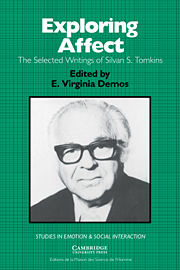Book contents
- Frontmatter
- Contents
- Foreword
- Editor's preface
- List of contributors
- Chronology
- Introduction
- Part I Affect theory
- Introduction
- Selections by Silvan S. Tomkins
- Part II Affect and ideology
- Introduction
- Selections by Silvan S. Tomkins
- Ideology and affect
- The socialization of affect and the resultant ideo-affective postures which evoke resonance to the ideological polarity
- Commentary: The ideology of research strategies
- Part III The face of affect
- Introduction
- Selections by Silvan S. Tomkins
- Part IV Script theory: The differential magnification of affect
- Introduction
- Selections by Silvan S. Tomkins
- Part V Human being theory: A foundation for the study of personality
- Introduction
- Selections by Silvan S. Tomkins
- A complete annotated bibliography of Silvan S. Tomkins's writings
- References
- Author index
- Subject index
- Titles in the series
The socialization of affect and the resultant ideo-affective postures which evoke resonance to the ideological polarity
Published online by Cambridge University Press: 10 November 2010
- Frontmatter
- Contents
- Foreword
- Editor's preface
- List of contributors
- Chronology
- Introduction
- Part I Affect theory
- Introduction
- Selections by Silvan S. Tomkins
- Part II Affect and ideology
- Introduction
- Selections by Silvan S. Tomkins
- Ideology and affect
- The socialization of affect and the resultant ideo-affective postures which evoke resonance to the ideological polarity
- Commentary: The ideology of research strategies
- Part III The face of affect
- Introduction
- Selections by Silvan S. Tomkins
- Part IV Script theory: The differential magnification of affect
- Introduction
- Selections by Silvan S. Tomkins
- Part V Human being theory: A foundation for the study of personality
- Introduction
- Selections by Silvan S. Tomkins
- A complete annotated bibliography of Silvan S. Tomkins's writings
- References
- Author index
- Subject index
- Titles in the series
Summary
Let us now consider how the socialization of affect produces those ideo affective postures which in turn make the individual resonate to the right, left, or middle-of-the-road positions in the ideological polarity. The details of the difference in socialization concern differences in tolerance or intolerance of the several primary human affects – excitement, enjoyment, surprise, distress, contempt, shame, fear, and anger – which in turn determine how positively or how negatively a human being learns to feel about himself and about other human beings. Such learning will also determine his general posture toward the entire ideological domain. We will consider the socialization of each of the affects. Before we do this, however, we will present an overview of the matter.
What might be the origins of such a duality in man's view of himself? Consider the basic alternatives open to parents interacting with their children. At one pole is that return of the parent to his own golden age through identification with the child in play and shared delight. The child's zest for life and obvious joy in simple human interaction and in elementary curiosity and attempted control over his own body and the world in general can revitalize the adult personality. Such a parent bestows on the child the feeling that he is an end in himself and that shared human interaction is a deeply satisfying experience. Further, such a parent will not puncture the child's conception of his ability to control his parent.
- Type
- Chapter
- Information
- Exploring AffectThe Selected Writings of Silvan S Tomkins, pp. 168 - 195Publisher: Cambridge University PressPrint publication year: 1995
- 2
- Cited by



